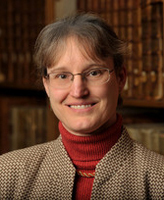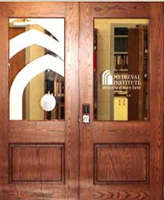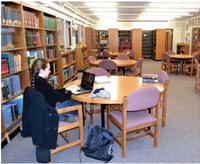The Medieval Institute: A Community of Medievalists

The Medieval Institute, located on the seventh floor of the Hesburgh Library, is a scholarly and academic unit of the University that promotes research and teaching on the cultures, languages, and religions of the medieval period (from roughly the fifth through 15th centuries).
The institute offers a home to more than 60 medievalists from across the faculty, says Olivia Remie Constable, the Robert M. Conway Director of the institute.
“We combine teaching, research and community,” she says. “We’re very broad-minded. It’s wonderful to have such a large community of medievalists at Notre Dame.”
Medieval Institute faculty come from The Law School and more than a dozen different departments in the College of Arts and Letters, including anthropology; art, art history, and design; classics; English; German and Russian languages and literatures; history; Irish language and literature; music; philosophy; political science; Program of Liberal Studies; Romance languages and literatures; and theology, as well as the History and Philosophy of Science Program.

The institute’s seventh-floor space includes a reading room and library that houses more than 100,000 volumes, including primary and secondary source materials, reference materials, and scholarly journals. A paleography room houses manuscript catalogs. In addition, nearly the complete holdings of the Ambrosiana Library in Milan, Italy, are available on microfilm. The space also includes a seminar room for classes, and carrels for graduate students. There are also are some offices for faculty and visiting scholars on the sixth floor.
An academic and teaching unit, the Medieval Institute offers undergraduate majors and minors, as well as a graduate Ph.D. in Medieval Studies. Typically there are 40 to 50 undergraduate majors, who also may participate in a study-abroad program based in St. Andrews, Scotland. Four to five graduate students are admitted annually to study for careers in academia, museums, or libraries.

The institute is currently expanding the area of Byzantine studies—an integral part of medieval studies, focusing on the Eastern Roman Empire in the Middle Ages, notes Roberta Baranowski, associate institute director. Expansion of Byzantine studies will include the addition of a new faculty position in Byzantine history and a faculty chair in Byzantine theology. A new Byzantine reading room, which will include an area devoted to Arabic and Near Eastern studies, will have its grand opening in late February.
With the goal of creating a vibrant community of medievalists, the Institute also sponsors lectures, conferences, colloquia, workshops, and seminars. The Institute in 2015 will host the prestigious Medieval Academy of America annual meeting.
Learn More >
- Medieval Institute
- Related story: Notre Dame Announces First Chair in Byzantine Studies
- Related story: Cataloguing of Ambrosiana Drawings Nears Completion
Originally published by Carol Bradley at al.nd.edu on January 12, 2012.